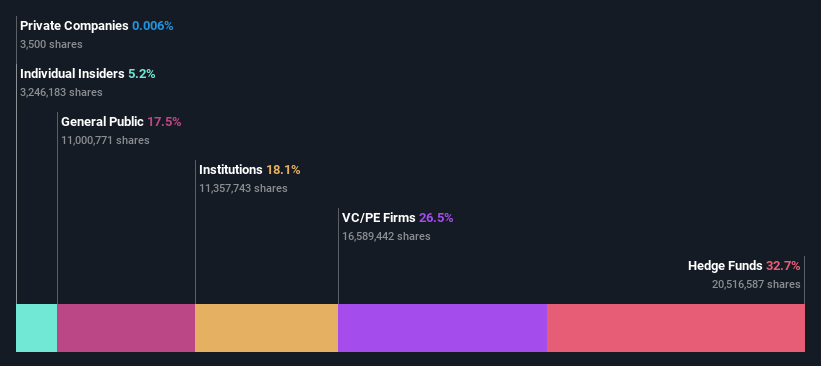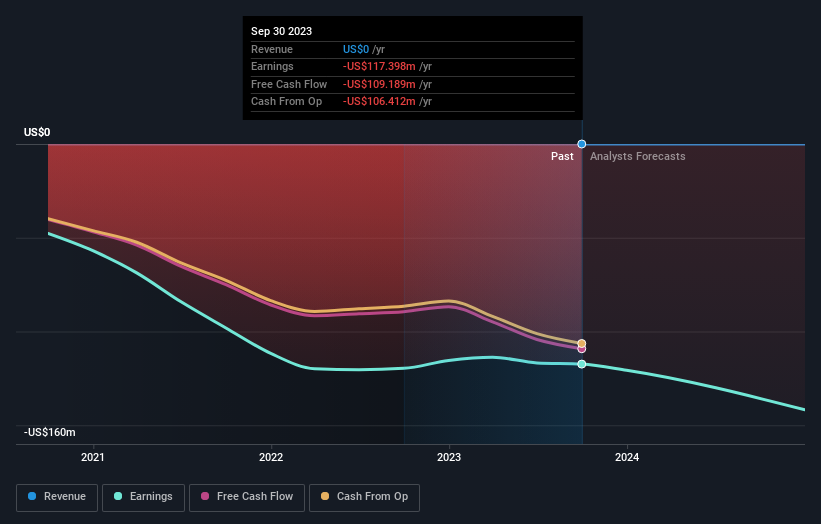Prelude Therapeutics Incorporated (NASDAQ:PRLD) is definitely on the radar of hedge funds investors who own 33% of the company
Key Insights
Given the large stake in the stock by institutions, Prelude Therapeutics' stock price might be vulnerable to their trading decisions
The top 2 shareholders own 54% of the company
Ownership research, combined with past performance data can help provide a good understanding of opportunities in a stock
Every investor in Prelude Therapeutics Incorporated (NASDAQ:PRLD) should be aware of the most powerful shareholder groups. We can see that hedge funds own the lion's share in the company with 33% ownership. In other words, the group stands to gain the most (or lose the most) from their investment into the company.
Because hedge funds owners have a huge pool of resources and liquidity, their investing decisions tend to carry a great deal of weight, especially with individual investors. Hence, having a considerable amount of institutional money invested in a company is often regarded as a desirable trait.
Let's delve deeper into each type of owner of Prelude Therapeutics, beginning with the chart below.
See our latest analysis for Prelude Therapeutics
What Does The Institutional Ownership Tell Us About Prelude Therapeutics?
Institutional investors commonly compare their own returns to the returns of a commonly followed index. So they generally do consider buying larger companies that are included in the relevant benchmark index.
As you can see, institutional investors have a fair amount of stake in Prelude Therapeutics. This can indicate that the company has a certain degree of credibility in the investment community. However, it is best to be wary of relying on the supposed validation that comes with institutional investors. They too, get it wrong sometimes. If multiple institutions change their view on a stock at the same time, you could see the share price drop fast. It's therefore worth looking at Prelude Therapeutics' earnings history below. Of course, the future is what really matters.
It looks like hedge funds own 33% of Prelude Therapeutics shares. That's interesting, because hedge funds can be quite active and activist. Many look for medium term catalysts that will drive the share price higher. Looking at our data, we can see that the largest shareholder is Baker Bros. Advisors LP with 28% of shares outstanding. In comparison, the second and third largest shareholders hold about 26% and 5.1% of the stock. Additionally, the company's CEO Krishna Vaddi directly holds 3.4% of the total shares outstanding.
To make our study more interesting, we found that the top 2 shareholders have a majority ownership in the company, meaning that they are powerful enough to influence the decisions of the company.
While it makes sense to study institutional ownership data for a company, it also makes sense to study analyst sentiments to know which way the wind is blowing. While there is some analyst coverage, the company is probably not widely covered. So it could gain more attention, down the track.
Insider Ownership Of Prelude Therapeutics
The definition of an insider can differ slightly between different countries, but members of the board of directors always count. The company management answer to the board and the latter should represent the interests of shareholders. Notably, sometimes top-level managers are on the board themselves.
Most consider insider ownership a positive because it can indicate the board is well aligned with other shareholders. However, on some occasions too much power is concentrated within this group.
We can see that insiders own shares in Prelude Therapeutics Incorporated. It has a market capitalization of just US$237m, and insiders have US$12m worth of shares, in their own names. Some would say this shows alignment of interests between shareholders and the board. But it might be worth checking if those insiders have been selling.
General Public Ownership
The general public, who are usually individual investors, hold a 18% stake in Prelude Therapeutics. This size of ownership, while considerable, may not be enough to change company policy if the decision is not in sync with other large shareholders.
Private Equity Ownership
With an ownership of 26%, private equity firms are in a position to play a role in shaping corporate strategy with a focus on value creation. Sometimes we see private equity stick around for the long term, but generally speaking they have a shorter investment horizon and -- as the name suggests -- don't invest in public companies much. After some time they may look to sell and redeploy capital elsewhere.
Next Steps:
While it is well worth considering the different groups that own a company, there are other factors that are even more important. Consider for instance, the ever-present spectre of investment risk. We've identified 5 warning signs with Prelude Therapeutics (at least 2 which are concerning) , and understanding them should be part of your investment process.
Ultimately the future is most important. You can access this free report on analyst forecasts for the company.
NB: Figures in this article are calculated using data from the last twelve months, which refer to the 12-month period ending on the last date of the month the financial statement is dated. This may not be consistent with full year annual report figures.
Have feedback on this article? Concerned about the content? Get in touch with us directly. Alternatively, email editorial-team (at) simplywallst.com.
This article by Simply Wall St is general in nature. We provide commentary based on historical data and analyst forecasts only using an unbiased methodology and our articles are not intended to be financial advice. It does not constitute a recommendation to buy or sell any stock, and does not take account of your objectives, or your financial situation. We aim to bring you long-term focused analysis driven by fundamental data. Note that our analysis may not factor in the latest price-sensitive company announcements or qualitative material. Simply Wall St has no position in any stocks mentioned.


